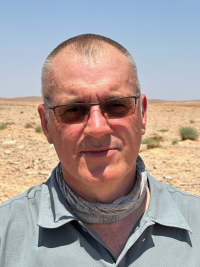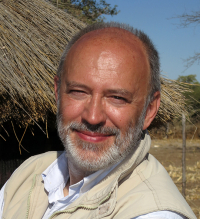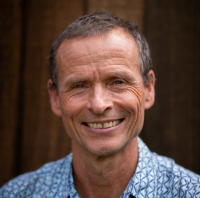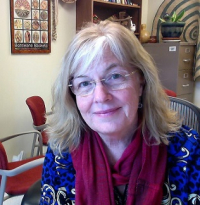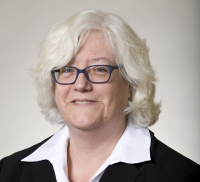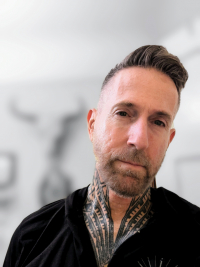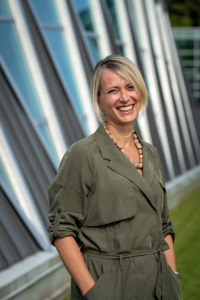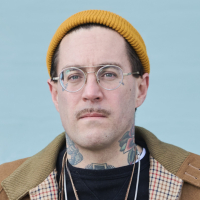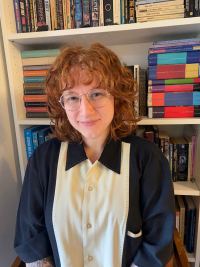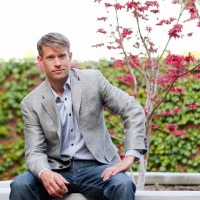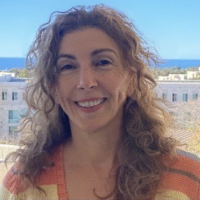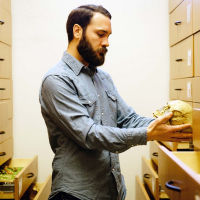Body Modification: Anatomy, Alteration, and Art in Anthropogeny
Biographical Sketches: Co-Chairs
Simon Fraser University
Mark Collard is the Canada Research Chair in Human Evolutionary Studies and a Full Professor in the Department of Archaeology at Simon Fraser University in Burnaby, British Columbia, Canada. After the 1987 Black Monday stock market crash put paid to his career as a private client stockbroker in the City of London, Collard pursued an undergraduate degree in archaeology and prehistory at the University of Sheffield. Subsequently, he completed a Ph.D. in human palaeontology at the University of Liverpool. Since that time, he has taught at universities in the UK, USA, and Canada, and conducted research on a wide range of anthropological topics using the conceptual and analytical tools of evolutionary biology. Among the topics he has worked on are the identification of species in the hominin fossil record; the reconstruction of hominin evolutionary relationships; the estimation of body mass, stature, and age from skeletal material; the processes responsible for the evolution of cultural diversity; the determinants of technological variation among non-industrial populations; and the colonisation of the Americas. Currently, Collard is interested in the evolution of religion, hunter-gatherer mobility, and evolutionary medicine. In addition, he is conducting archaeological fieldwork in Jordan.
University of Bordeaux
Francesco d’Errico is a CNRS Director of Exceptional Class at the University of Bordeaux, France and Professor at the Centre for Early Sapiens Behaviour, University of Bergen, Norway. His academic interests focus on the evolution of human cognition, the emergence of symbolic cultural practices in Africa and Eurasia, and the application of innovative analytical techniques to the study of past material culture. He has conducted archaeological and ethnoarchaeological research in Europe, South Africa, Namibia, Kenya, Ethiopia, Morocco, Ukraine and China. An author of hundreds of articles in peer reviewed journals, he has been ranked between 2014 and 2021 among the 1% most cited researchers on the planet in his field. He has been awarded two large ERC grants to investigate the origin of modern cultures and the evolution of numerical cognition.
Biographical Sketches: Speakers
UC San Diego
Pascal Gagneux is CARTA's Executive Co-Director, a Professor of Pathology and Anthropology, and the Department Chair of Anthropology at UC San Diego. He is interested in the evolutionary mechanisms responsible for generating and maintaining primate molecular diversity. The Gagneux laboratory studies cell-surface molecules in closely related primates species. His focus is on glycans, the oligosaccharides attached to glycolipids and glycoproteins of the surfaces of every cell and also secreted into the extra-cellular matrix. Gagneux's laboratory is exploring the roles of molecular diversity in protecting populations from pathogens as well as potential consequences for reproductive compatibility. Dr. Gagneux’s interest is in how glycan evolution is shaped by constraints from endogenous biochemistry and exogenous, pathogen-mediated natural selection, but could also have consequences for sexual selection. Dr. Gagneux has studied the behavioral ecology of wild chimpanzees in the Taï Forest, Ivory Coast, population genetics of West African chimpanzees, and differences in sialic acid biology between humans and great apes with special consideration of their differing pathogen regimes. In 2011, while Associate Director of CARTA, Dr. Gagneux helped to establish a graduate specialization in Anthropogeny at UC San Diego. This wholly unique graduate specialization is offered through eight participating graduate programs in the social and natural sciences at UC San Diego.
Purdue University
Ellen Gruenbaum is an Emeritus Professor of Anthropology and former Chair of the Anthropology Department at Purdue University. Gruenbaum is a culturally-oriented medical anthropologist and her ethnographic research focuses on women’s health issues, gender, human rights, religious practices, and development in Africa and the Middle East. Using a feminist anthropological framework, she conducts research on female genital cutting practices and the change efforts promoting abandonment in Sudan and Sierra Leone, where she also served as a research consultant to UNICEF and CARE. She also investigates cultural contexts affecting breast cancer responses and prevention possibilities in Purdue’s international and cross-disciplinary project entitled, International Breast Cancer and Nutrition, with collaborations in Ghana, Lebanon, and Uruguay.
University of California Berkeley
Rosemary Joyce is a Distinguished Professor of Anthropology at the University of California Berkeley. She defines her research as concerning how things make people as people make things, attending to human and non-human agency. Her books Gender and Power in Prehispanic Mesoamerica (University of Texas Press, 2001) and Ancient Bodies, Ancient Lives (Thames and Hudson, 2008) expanded theoretical work on sex in archaeology beyond the gender binary. Her latest book, The Future of Nuclear Waste (Oxford University Press, 2020), examines how ideas about monuments serve to guide planning for US nuclear waste. A recipient of fellowships from the John Simon Guggenheim Foundation, the Bunting Institute at Radcliffe, and the Center for Advanced Study in the Behavioral Sciences at Stanford, in 2022 she was awarded an honorary doctorate by Leiden University; the "Premio Jesús Núñez Chinchilla" by the Instituto Hondureño de Antropología e Historia, and the A. V. Kidder Award for Eminence in American Archaeology of the American Anthropological Association.
Body Piercing Archive, USA
Paul King is the Founder and a Committee Chair of the Body Piercing Archive, USA, and has served as Treasurer of the Association of Professional Piercers since 2008. The mission of the Body Piercing Archive is to select, collect, document, preserve, exhibit, and interpret the personal, social, and material evolving histories of Body Piercing to ensure these artifacts are available to present and successive generations. In 1991, he began a 1½-year piercing apprenticeship under Elayne Angel, author of The Piercing Bible (Ten Speed Press, 2009). He worked in all three and managed two of the former Gauntlet locations. King has lectured on body modification since 1993. He graduated from UC Berkeley with a B.A. degree, highest honors in Anthropology. He was awarded the title of Master Piercer by Gauntlet’s founder Jim Ward. In 1999, he opened Cold Steel, a piercing and tattooing shop in San Francisco.
University of Northern British Columbia
Shauna LaTosky is an Assistant Professor in Anthropology at the University of Northern British Columbia, (UNBC) Canada. Prior to joining UNBC she worked as a lecturer at Thompson Rivers University and was formerly Director of the South Omo Research Center (Jinka, Ethiopia) and a post-doctoral fellow at the Max Planck Institute for Social Anthropology (Halle, Germany). LaTosky earned a PhD in Anthropology and African Studies at the Johannes Gutenberg University, Germany. Her current research interests gravitate around three different topics: material culture, embodied and visual rhetoric, and Mun (Mursi) cultural and ecological heritage. Since 2018, she has been interested in collaborative research on Indigenous knowledge of edible and medicinal plants and emic understandings of wild plant foods and their cultural and gendered meanings and uses in Southern Ethiopia.
University of Essex, UK
Matt Lodder is a Senior Lecturer in Art History and Theory, Director of American Studies, and a Public Voice Scholar at the University of Essex, UK. His first monograph, Painted People: Humanity in 21 Tattoos, was published by HarperCollins in 2022. His latest major exhibition, British Tattoo Art Revealed, began at the National Maritime Museum Falmouth in March 2017 and toured nationwide through 2020. His tattoo podcast, Beneath the Skin, was recently voted best independent history podcast in the UK.
Simon Fraser University
Brea McCauley is a PhD candidate at Simon Fraser University. She is overall fascinated by permanent body modification: the origin, evolution, history, and prevalence of the variable types of body modification practices; why we, as humans, permanently modify ourselves; and whether permanent body modification may be a universal cross-cultural custom. Her previous research in this area has centered on cultural finger amputation practices. Her publications on cultural finger amputation have looked at the occurrence of these practices in the ethnographic, historical, archaeological, and folktale records and have found that finger amputation has been a surprisingly common custom in human history. Her PhD thesis focuses on permanent body modification practices more broadly and provides a cross-cultural perspective on the variability of these customs and the cultural motivations for engaging in them.
California State University, Fullerton
Ryan Nichols is a professor of philosophy at California State University, Fullerton. He is an interdisciplinary researcher who, since 2004, has been mostly focused on the question ‘What made China Chinese?’ In pursuit of an answer, he has collaborated with researchers in the humanities, gene-culture co-evolution, psychology, social science, life science, data science, genetics, and mathematics. Ryan has published a monograph with Oxford, and edited The Routledge International Handbook of Morality, Cognition, and Emotion in China (2022). He has held fellowships at University of British Columbia, Notre Dame, the National Endowment for the Humanities, a three-year Academic Cross-Training fellowship, and in 2025-26 will be on fellowship at the Hanse-Wissenschaftskolleg. He makes an effort to learn from everyone he meets. He is looking forward to the 'How humans came to construct their worlds' because of the theme's connection to niche construction theory, cultural evolution, and the opportunity it affords to explore with experts ways in which evolutionary psychological factors, e.g. mate guarding, may have influenced architecture.
UC San Diego
Katerina Semendeferi is Professor of Anthropology and Director of the Laboratory for Human Comparative Neuroanatomy at UC San Diego. She is CARTA Co-Director and elected fellow of the American Association for the Advancement of Science. Semendeferi’s studies of the fronto-limbic circuitry showed that the relative size of the frontal cortex is remarkably similar across apes and humans and that evolutionary changes are found in some, but not all, regions of the human frontal lobe and amygdala. Her laboratory explores links between the phylogenetically reorganized brain regions and vulnerabilities observed in atypical human neurodevelopment (Autism and Williams Syndrome). Semendeferi has been involved with multiple lines of research in human evolution, including the fossil record, and pioneered the application of noninvasive imaging tools to the study of the brain of the apes. She maintains an interest in bringing together multiple fields of inquiry including efforts to bridge classical quantitative neuroanatomy with the field of induced pluripotent stem cells and brain organoids.
Universidade de Coimbra, Portugal
John Willman is researcher at CIAS—The Research Centre for Anthropology and Health, Department of Life Sciences, Universidade de Coimbra, Portugal. He is the co-director of the Virtual Anthropology Laboratory and a member of the Laboratory of Prehistory. His broad research interests span topics in the areas of paleoanthropology, bioarchaeology, dental anthropology, and domestication.
